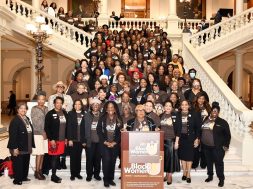
To Fight Poverty, Communities of Color Need an Increased Minimum Wage #HispanicHeritageMonth
 By Janet Murguía, President and CEO of NCLR (ReMarcs Newsletter)- New data released by the U.S. Census Bureau this week paints an alarming picture for communities of color; the rates of poverty for Black and Latino communities remain disproportionately high. In fact, about one out of four people in both communities lives in poverty. While the economy is slowly recovering from the Great Recession, that recovery isn’t reaching everybody. And it’s those in the poorest communities who are being left out in the cold.
By Janet Murguía, President and CEO of NCLR (ReMarcs Newsletter)- New data released by the U.S. Census Bureau this week paints an alarming picture for communities of color; the rates of poverty for Black and Latino communities remain disproportionately high. In fact, about one out of four people in both communities lives in poverty. While the economy is slowly recovering from the Great Recession, that recovery isn’t reaching everybody. And it’s those in the poorest communities who are being left out in the cold.
Congress has the ability to make a dent in these poverty rates by giving low-wage workers a much-needed raise. Since 2009, the federal minimum wage has been stuck at a meager $7.25 per hour, which leaves struggling workers with barely enough income to keep their lights on and to put food on the table. We can do better for the nation’s low-wage workers, many of whom are Black and Latino.
Right now, there is legislation in Congress that would raise the federal minimum wage to $10.10 per hour. While fewer than $3 more per hour may seem almost negligible to many people, it would boost the income of nearly seven million Latino workers; more than 40 percent of Latino workers earn poverty-level wages. Likewise, raising the minimum wage would help more than four million Black workers; 36 percent of Black workers currently earn poverty-level wages.
As we celebrate Hispanic Heritage Month, the National Council of La Raza (NCLR) joins its other partners, such as the National Urban League (NUL), to tell Congress that we can’t wait any longer for them to act. If we want this legislation passed, then we need to make our voices heard. There is no better way to grab the attention of lawmakers than to show up to the polls on Election Day.
For a struggling family, every dollar counts. And for a politician up for reelection, every vote counts. This November, stand up for those lawmakers who will stand by our workers and our community by giving them the opportunity to earn decent, livable wages.






